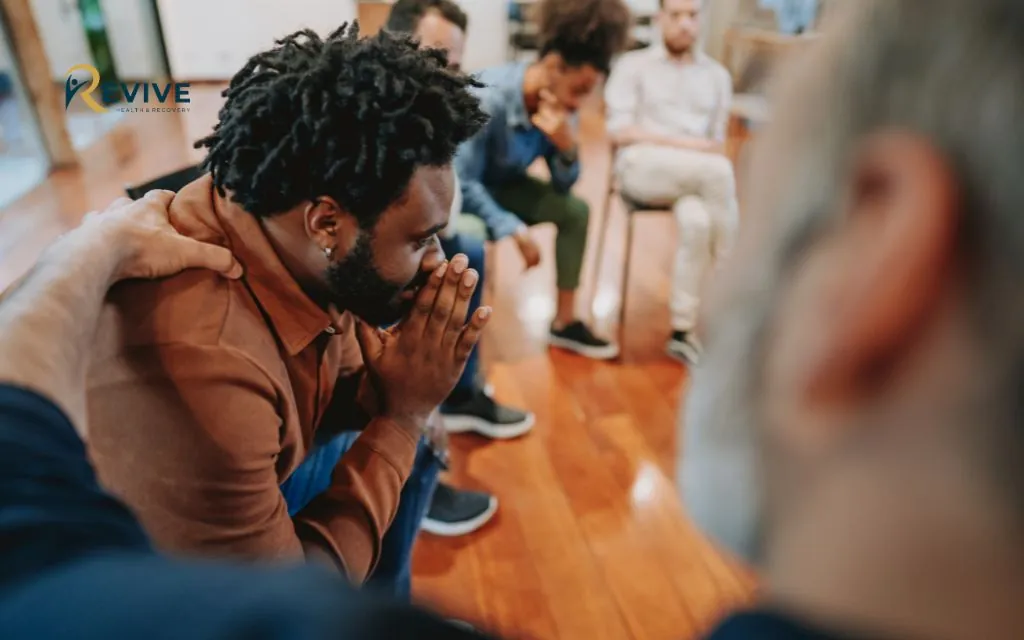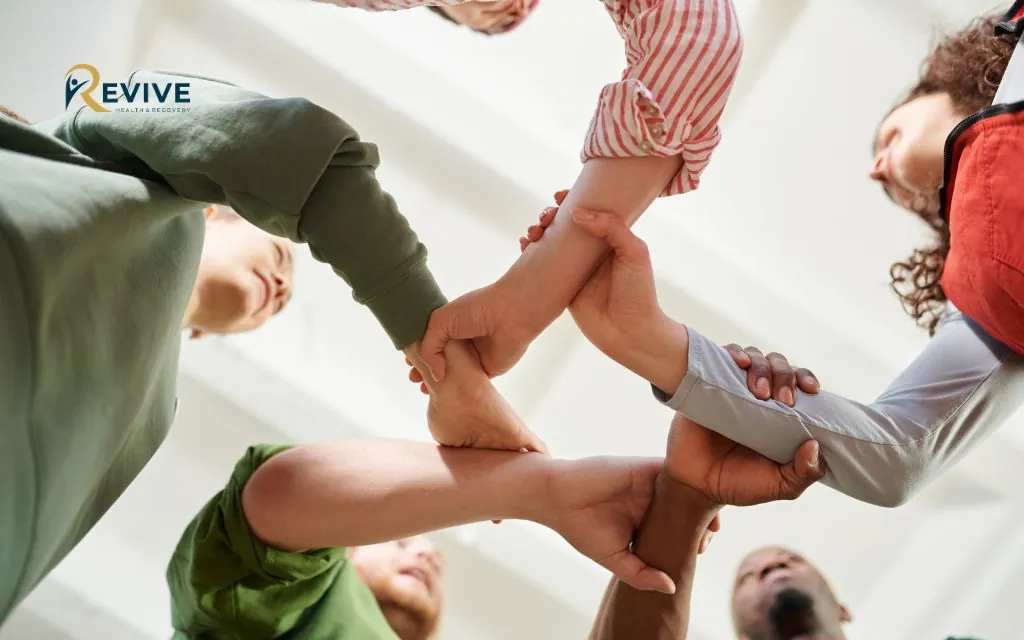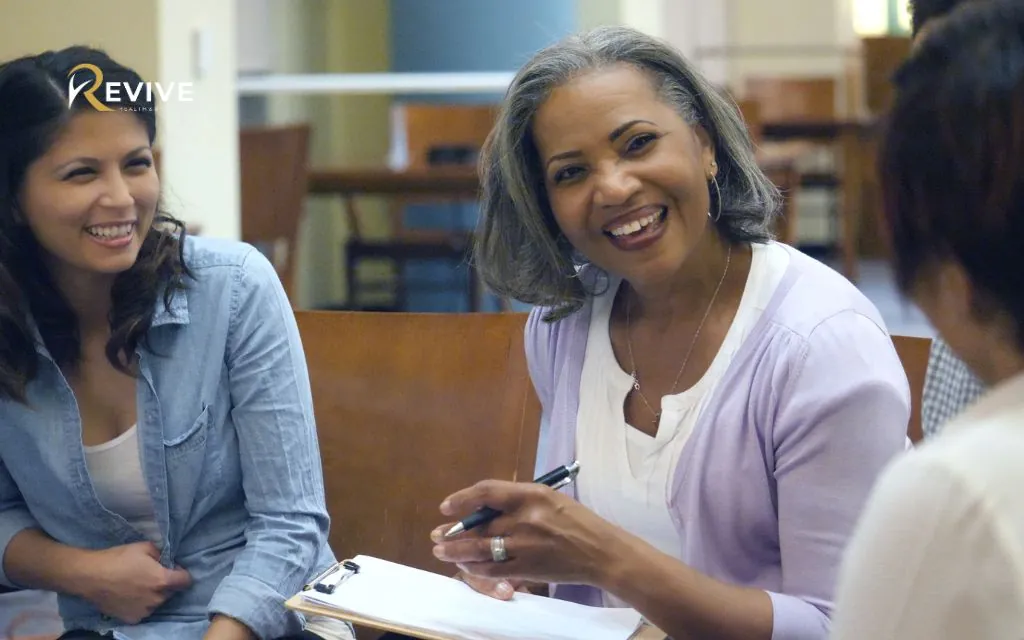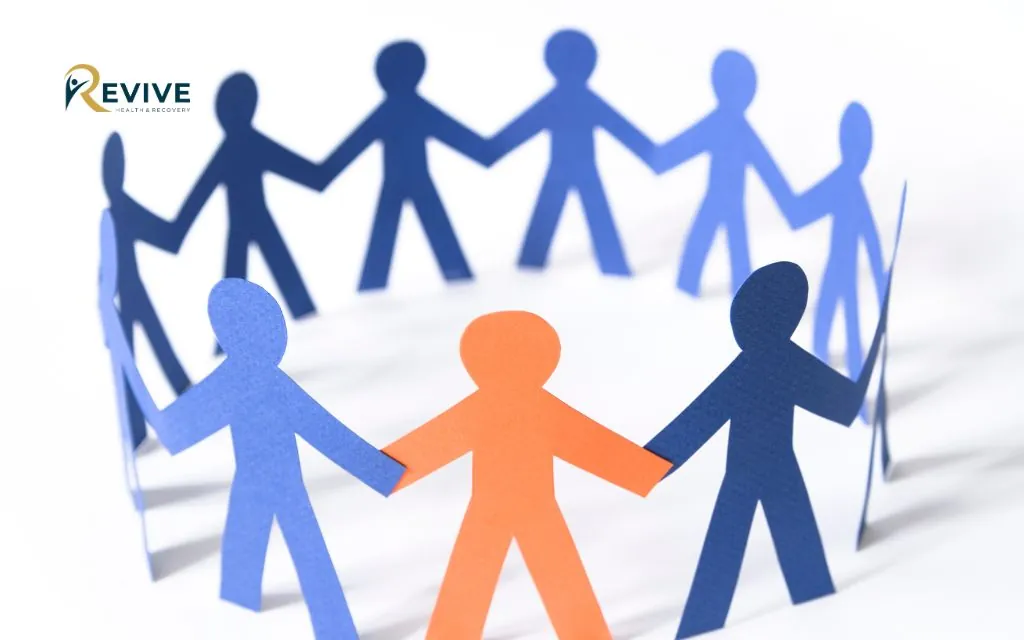Addiction is a strong challenge that affects not just your body, but your mind and everyday life too. It can make you feel lonely, stuck, and unsure of how to move forward. Even though the road to recovery might seem tough, having the right support can change everything. Addiction support groups Denver are a great way to get help, offering a safe place to talk, learn from others, and find the strength to keep going.
Addiction support groups Denver, like those offered at Revive Health Recovery, provide an essential foundation for lasting recovery. These groups are particularly effective for individuals dealing with dual diagnosis, as they offer a supportive environment for managing both addiction and co-occurring mental health conditions.
If you’re ready to explore new ways of healing, let’s take a closer look at how support groups can be a game-changer in your recovery journey.
What are Addiction Support Groups?
Support groups are meetings where people who are recovering from drug or alcohol addiction can come together. These groups give everyone a chance to talk about their struggles and share their experiences with others who understand what they’re going through.
Support groups usually work alongside other treatment programs, but some people find that just attending a support group is enough to help them stay sober. However, it’s important to remember that support groups are not meant to replace professional treatment. They’re there to offer extra help and encouragement as part of the recovery process.

Differences Between Support Groups and Group Therapy
In addiction support groups Denver, people who are going through the same struggles meet to share their stories and support each other in a safe and respectful space. Everyone can ask questions, talk about their challenges, and discuss their recovery without fear of being judged.
These groups help people who are recovering to find strength and keep moving forward on their own recovery journey. No personal records are kept, and the best part is that support groups are always free.
On the other hand, group therapy is a more formal treatment where a professional therapist or counselor leads the session. These sessions focus on both addiction and mental health, and members work together to address their issues with guidance from a trained expert.
Group therapy can sometimes be more direct and challenging, helping members face their problems honestly. Therapy groups are usually billed to insurance, similar to private therapy, but in a group setting.
Benefits of Addiction Support Groups Denver for Mental Health Recovery
A support group is a safe space where you can talk about your feelings and what’s going on in your life with people who understand what you’re going through and won’t judge you.
Support Groups Help You Feel Less Alone
Support groups for addiction are a wonderful way for people in recovery to connect with others who understand what they’re going through. These groups let you share experiences, get advice, and feel supported by people who have been through similar struggles.
Attending a meeting can help you feel less alone, and it can lift you up when you’re feeling down, frustrated, or scared, reminding you that there’s a community of people who truly care and understand you.
Meetings Offer Compassion and Emotional Support
Having a group of people to turn to and share your feelings with can help you stay strong in recovery. Support groups for alcohol or drug addiction give you a safe space where you can talk openly without fear of being judged.
You can share your struggles and hear from others who have faced the same challenges. And when someone gives advice, you know it’s coming from someone who truly understands what you’re going through.

They Encourage Self-acceptance
Shame and guilt can make recovery really tough, and sometimes people turn back to drugs or alcohol to escape those feelings of being “not good enough.” But support groups for addiction can help by showing you that you’re not alone. These groups bring together people who also struggle with addiction, and you’ll see how valuable everyone is, including yourself.
Talking openly in a safe, supportive space helps you accept who you are and what you’ve been through. This kind of self-acceptance is important for staying strong in your recovery, helping you take responsibility for your struggles while still loving and caring for yourself.
Support Groups Teach Valuable Skills
In addiction support groups Denver, you’ll meet a lot of different people, each with their own story and experience. Everyone brings something valuable to the table, and most people will have learned useful ways to cope with challenges during their recovery.
They can share what has worked for them, giving you new ideas to try. Sometimes, just listening to others’ stories can teach you important lessons and help you find better ways to handle your own struggles.
Meetings Provide Motivation and Inspiration
Hearing how others have struggled with addiction and how they were able to turn their lives around can be really inspiring. When you listen to someone share their story of how they overcame challenges and rebuilt their life, it can give you hope and remind you that you have the strength to do the same. Seeing others succeed shows that recovery is possible, and you can do it too.
Helping Others Can Make You Stronger
Support groups for addiction are not only helpful for you, but they also give you a chance to help others. When you help someone else, it can actually make you feel stronger and more confident.
Research shows that people who focus on doing meaningful things, instead of just looking for fun or pleasure, tend to be happier and feel like their life has more purpose. Helping others in the group can make you feel good about yourself and your recovery.

10 Different Addiction Support Groups Denver
When it comes to recovery, there’s no one right way for everyone. Since people respond differently to different approaches, it’s a great idea to explore different addiction support groups Denver and see which one feels like the best fit for you.
12-Step Programs
12-step programs are tools that help people manage their addiction. They can be used as ongoing support after detox and rehab, or as the main way to work through addiction.
In these programs, members attend meetings and recovery sessions in their communities. They talk about their struggles with addiction and support each other in staying sober.
One benefit of 12-step programs is that members avoid being around people who are still struggling with addiction, which can reduce the temptation to relapse. They also build strong friendships with others who share similar goals and enjoy fun, sober activities together.
Some of the 12-step programs include:
- Alcoholics Anonymous
- Heroin Anonymous
- Marijuana Anonymous
- Pills Anonymous
- Cocaine Anonymous
- Crystal Meth Anonymous
Alcoholics Anonymous (AA)
Alcoholics Anonymous (AA) is a group of men and women who have struggled with alcohol use or are working on staying sober. The goal of AA is to offer hope and support to people dealing with alcohol addiction.
AA holds meetings around the world, usually lasting between one hour to an hour and a half, but never more than 90 minutes. Each meeting starts with a short prayer, often a version of The Serenity Prayer.
SMART Recovery
SMART Recovery is a worldwide group that helps people live happier lives without addiction. It teaches useful skills for managing tough emotions, avoiding relapse, and replacing unhealthy habits with better ones.
The program recognizes that people often turn to addictions to cope with problems, but in the long run, those addictions cause more harm. Joining SMART Recovery is free, making it accessible to anyone who wants support on their journey to recovery.
Al-Anon (Support for People Affected by Alcoholism)
Al-Anon is a group for family members and friends of people who struggle with alcohol use. It’s a place where you can share your own experiences and learn from others who understand what you’re going through.
The group follows the Twelve Steps, which helps members support each other and find ways to better understand their loved ones with alcohol problems. Al-Anon is run by the donations of its members, so you don’t have to pay to be part of it.
Alateen Support Groups
Alateen is a support group for young people who have family members or friends struggling with alcohol use. It’s part of the Al-Anon family and follows the same 12-step approach.
In Alateen, you can find support, share experiences, and connect with others going through similar challenges. The main goal of Alateen is to help young people cope with the effects of alcohol on their loved ones and to offer a space where they can feel understood and supported.

Secular Organizations for Sobriety
Secular Organizations for Sobriety (SOS) is a support group that offers an alternative to the spiritual focus of 12-step programs like Alcoholics Anonymous. It’s a network of peer-led meetings where people can talk about their struggles and support each other in a safe, non-judgmental space.
SOS welcomes anyone who is working on overcoming addiction, whether it’s drugs, alcohol, or any other behavior. The meetings are free to join, and the main goal is to help people stay sober and focused on their recovery. SOS also encourages members to think about a daily Cycle of Sobriety, a three-part routine to help stay on track with their recovery journey.
Faith-Based Support Groups
For people who want to include their faith in their recovery, faith-based support groups can be a great choice. These groups combine the usual addiction treatment methods with spiritual support from a specific religion. While Alcoholics Anonymous (AA) believes in a higher power, it doesn’t tie itself to any one religion.
Faith-based support groups, on the other hand, connect recovery with religious teachings. You can find these groups for nearly every major religion, making it easier for people to follow their faith while working on their recovery.
Families Anonymous
Families Anonymous (FA) is a support group based on the 12-step model, designed to help family members and friends of people struggling with addiction.
Founded in 1971, FA follows a similar approach to Alcoholics Anonymous (AA). The main goal of FA is to provide a safe space where people can come together, share their experiences, and support each other. This helps everyone involved find healing and comfort as they work through difficult times together.
Narcotics Anonymous (NA)
Narcotics Anonymous (NA) is a program where people who are recovering from drug addiction come together to support each other and stay sober. Members attend meetings each week, where everything is kept private and anonymous.
The main goal of NA is to build strong support networks and help everyone stay completely drug-free. Even people who are still struggling with addiction are welcome to attend the meetings and get the help they need.
Other Support Groups
While support groups for alcohol and drug use are really important, addiction can also lead to other serious problems like trauma, grief, mental health struggles, and experiences of racism, sexism, or homophobia.
The good news is that there are many other support groups and helplines that focus on these issues. They offer help to people who may be facing not only addiction but also the extra challenges that come with being part of a marginalized community. These resources are here to make sure everyone gets the support they need.
What to Expect From a Support Group Denver
Addiction support groups Denver can feel different depending on the program, but one thing they all have in common is making sure you feel comfortable. The leaders and members will always respect your space and won’t push you into anything that makes you uncomfortable.
The main goal of these groups is to create a safe, supportive place for everyone. For example, in Alcoholics Anonymous (AA), meetings are often designed to encourage open talking, but you can choose to share as much or as little as you want. Trying out different support groups can help you find the one that works best for you.

How to Get the Most From Addiction Support Groups Denver
To get the most out of a support group, there are a few simple things you can do:
- Attend regularly. The more often you attend, the more you’ll get to know the group and feel comfortable. It helps build connections with others.
- Join in the discussions. Sharing your thoughts keeps the conversation going and helps everyone stay engaged. Your updates and advice might be really helpful to others.
- Be kind and understanding. Sometimes, something might be said that bothers you. Remember, everyone in the group is dealing with tough issues. If something upsets you, talk to the group leader about it so they can help.
- Know when it’s not the right fit. Every group is different, and the way people interact can change over time. If the group isn’t helping you, it’s okay to try a different one that better suits your needs.

Conclusion
Addiction support groups Denver play a crucial role in recovery by offering a safe and supportive environment. These groups help individuals connect with others who understand their struggles, share helpful coping strategies, and build a strong support network.
Whether you’re looking for emotional support, practical advice, or motivation, these groups can provide the strength needed to continue on the path to recovery. Remember, support groups are a valuable tool alongside other treatments, and seeking help is an important step in your healing journey.



